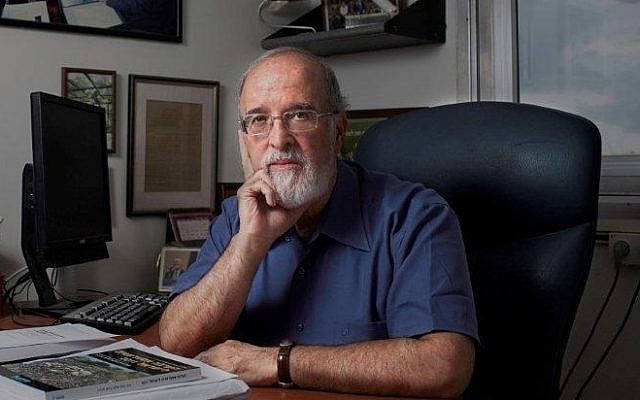'I HAVE NO EXPLANATION BUT THE NUMBERS SPEAK FOR THEMSELVES'
Top Israeli prof claims simple stats show virus plays itself out after 70 days
Isaac Ben-Israel, who is not a medical expert, says analysis worldwide shows new cases peaking after about 40 days, slams economic closures; leading doctor dismisses his claims
By
TOI STAFF14 April 2020, 4:47 pm
26

Isaac Ben-Israel (Photo credit: Courtesy)
A prominent Israeli mathematician, analyst and former general claims simple statistical analysis demonstrates that the spread of COVID-19 peaks after about 40 days and declines to almost zero after 70 days — no matter where it strikes, and no matter what measures governments impose to try to thwart it.
Prof
Isaac Ben-Israel, head of the Security Studies program in Tel Aviv University and the chairman of the National Council for Research and Development, told Israel’s Channel 12
(Hebrew) Monday night that research he conducted with a fellow professor, analyzing the growth and decline of new cases in countries around the world, showed repeatedly that “there’s a set pattern” and “the numbers speak for themselves.”
While he said he supports social distancing, the widespread shuttering of economies worldwide constitutes a demonstrable error in light of those statistics. In Israel’s case, he noted, about 140 people normally die every day. To have shuttered much of the economy because of a virus that is killing one or two a day is a radical error that is unnecessarily costing Israel 20% of its GDP, he charged.
Get The Times of Israel's Daily Edition by email and never miss our top storiesFREE SIGN UP
Prof. Gabi Barbash, a hospital director and the former Health Ministry director general, insisted in a bitter TV exchange that Ben-Israel is mistaken, and that the death tolls would have been far higher if Israel and other countries had not taken the steps they did.

Gabi Barbash, Director General at Tel Aviv Sourasky Medical Center, April 7, 2020. (Channel 12)
But Ben-Israel said the figures — notably from countries, such as Singapore, Taiwan, and Sweden, which did not take such radical measures to shutter their economies — proved his point. (He also
posted a Hebrew paper to this effect on Facebook, with
graphs showing the trajectories.)
When Barbash cited New York as ostensible proof that Ben-Israel was mistaken, Ben-Israel noted the latest indications from New York were precisely in line with his statistics that indicate daily new cases figures peaking and starting to fall after about 40 days.
Asked to explain the phenomenon, Ben-Israel, who also heads Israel’s Space Agency, later said: “I have no explanation. There are all kinds of speculations. Maybe it’s related to climate, or the virus has a life-span of its own.”
He said the policy of lockdowns and closures was a case of “mass hysteria.” Simple social distancing would be sufficient, he said.
If the lockdowns instituted in Israel and elsewhere were not causing such immense economic havoc, there wouldn’t be a problem with them, he said. “But you shouldn’t be closing down the entire country when most of the population is not at high risk.”
Asked to explain why the virus had caused such a high death toll in countries such as Italy, he said the Italian health service was already overwhelmed. “It collapsed in 2017 because of the flu,” he said.
Barbash, speaking after Ben-Israel had left the studio, insisted that “we’re going to be living with the coronavirus for the next year.”
He added: “I strongly urge that we not let mathematicians — who know nothing about biology — determine when we lift the lockdown



